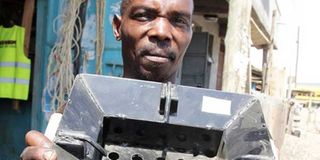Breaking News: At least 10 feared to have drowned in Makueni river
Making every penny count: a casual worker’s monthly budget

A jua kali artisan displays a jiko at his workshop at Salgaa, Nakuru County.A survey by Egerton University’s Tegemeo Institute in 2011 showed that while the wealthiest quintile of Kenyans spent 16 per cent on food, the lowest earning fifth spent 49 per cent of their income on nutrition. PHOTO | SULEIMAN MBATIAH
What you need to know:
David Kang’ethe, 26, once dreamt of becoming an aeronautical engineer, but could not afford school fees, so he ended up being a mason.
In a good month, Mr Kang’ethe, who lives alone, gets Sh24,000. “I get at least Sh1,000 a day, excluding Sundays,” he says.
“I spend about Sh200 on food daily; Sh50 on breakfast (tea with two mandazis), Sh100 on lunch comprising githeri with avocado and another Sh50 on supper (ugali and sukuma wiki).
A survey by Egerton University’s Tegemeo Institute in 2011 showed that while the wealthiest quintile of Kenyans spent 16 per cent on food, the lowest earning fifth spent 49 per cent of their income on nutrition.
But it is not just the poorest who are living hand to mouth. In 2015, the majority of Kenyans spent 44 per cent of their domestic income on food every month while the rich spent just 6.9 per cent.
To calculate inflation in urban areas, the Kenya National Bureau of Statistics classifies Kenyans as upper, middle and low income. Low-income households spend less than Sh23,000 a month on food, while the middle class spends between Sh23,000 and Sh120,000 each month on food, transport, airtime, entertainment and fashion. The upper class spends more than Sh120,000 a month on domestic items.
David Kang’ethe, 26, once dreamt of becoming an aeronautical engineer, but could not afford school fees, so he ended up being a mason.
In a good month, Mr Kang’ethe, who lives alone, gets Sh24,000. “I get at least Sh1,000 a day, excluding Sundays,” he says.
“I spend about Sh200 on food daily; Sh50 on breakfast (tea with two mandazis), Sh100 on lunch comprising githeri with avocado and another Sh50 on supper (ugali and sukuma wiki).
“A Sh100 packet of maize flour lasts me three days. I buy tomatoes and onions worth Sh200 weekly and Sh100 of airtime every day – what does that leave me with?” he asks. He eats a quarter kilo of meat, which costs Sh100, only once a month.
At the end of the month, he tries to buy groceries and toileteries worth about Sh2,000 and get a Sh50 haircut.
He buys clothes only when the occasion calls for it, which allows him to save Sh3,000 to pay rent for his bedsitter in Kitengela, Kajiado County.
His only indulgence is the m Sh4,000 he spends on alcohol monthly.
He mostly looks for casual jobs near home to reduce transport costs. “If, for instance, I get a job around Syokimau, I spend Sh100 daily on fare,” he says
Mr Kang’ethe spends about Sh23,000 of the Sh24,000 he gets in a good month, leaving him with little to save.
When casual jobs are scarce, he is forced to borrow Sh2,000 to see him through the month. “I would like to save about 50 per cent of what I get but find myself with 10 per cent or less, sometimes none…”
“My job is not permanent ...,” he says.
STARK CONTRAST
But while Mr Kang’ethe’s life is a consistent struggle, the wife of a nominated MP says she spends Sh16,000 on perishable foods alone every month, and another Sh20,000 on groceries to last them three months – for a household of three.
She spends Sh3,000 monthly on airtime and another Sh2,000 on the Internet. She spends between Sh10,000 and Sh30,000 on fuel every month.
“It could be true that we spend a lot on food. I buy a lot of food. In a month I can spend about 36,000 on food alone,” she says. “I save about 40 per cent of my salary.”
Meanwhile, millionaire Chris Kirubi, 75, says the key to prosperity is saving. “Without saving, you can never be anybody. If you spend more than you earn, you have a problem,” he says.
He says if possible, people should save about 50 per cent of their domestic income, as this will enable them to invest in the future.
Noting that people are looking to make money by gambling he remarks: “This trend will make Kenyans very poor because the only winner in this is the owner of the game. They are not out there to enrich anybody; they are out there to take money from every single person they can.”
Mr Kirubi, who does not gamble, added: “ Kenyans who dream of becoming rich by gambling should that nobody has ever become rich by gambling.”
He said the government could help reduce food prices by providing good infrastructure that eases transport.





